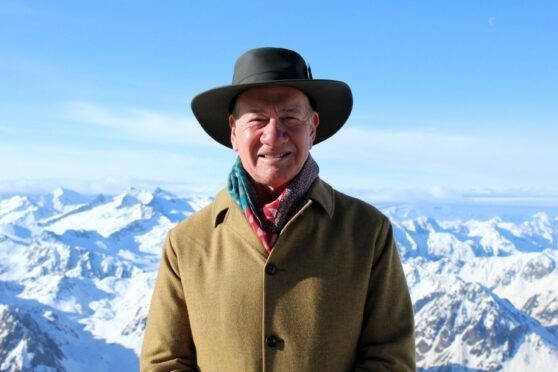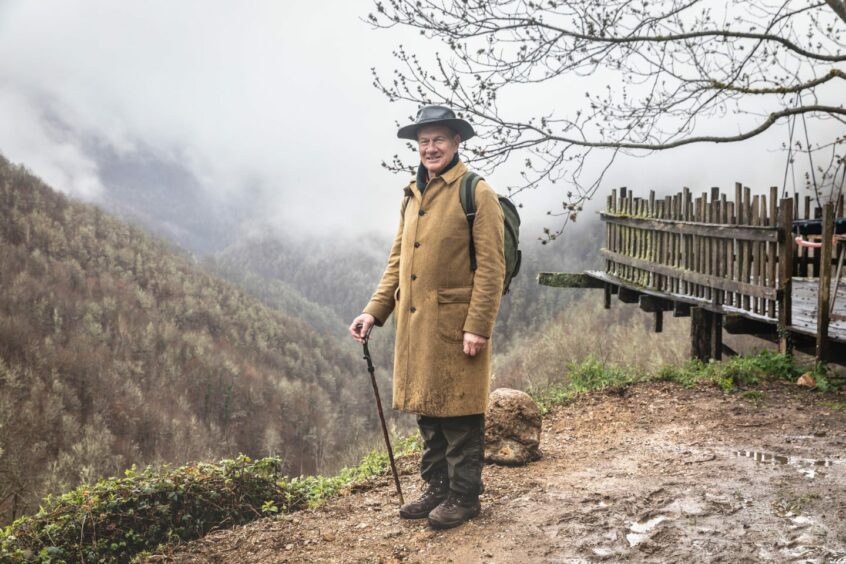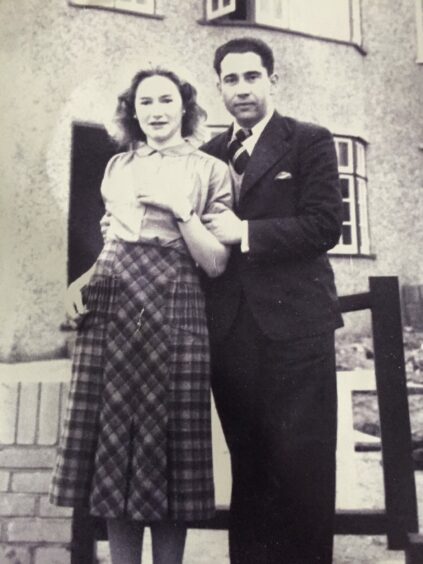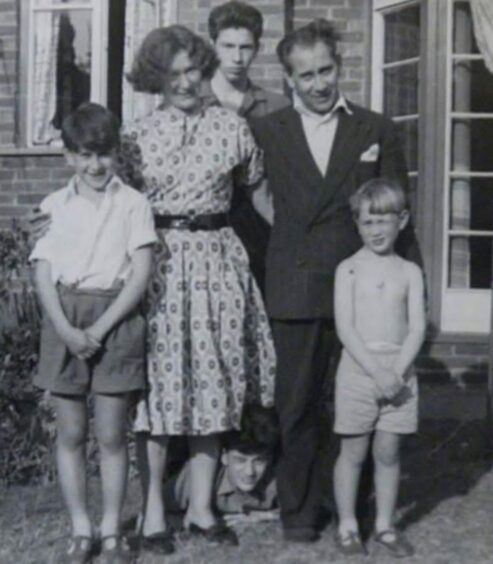
She was the beautiful daughter of a wealthy Scottish linen manufacturer. He was the “alien” who had fled Franco’s dictatorship at the end of the Spanish Civil War with nothing but the clothes on his back.
They met over their shared concern for Basque refugee children in Britain and fell madly in love. An Oxford University graduate and a woman ahead of her time, she proposed to him and when they married, it was without the blessing or support of her rich family.
But this is not the plot of a movie, it is the true-life love story of Cora Blyth from Kirkcaldy and Luis Portillo, a law professor and republican whose against-the-odds union created one of the UK’s best-known politicians-turned TV star.
Former Conservative Cabinet minister Michael Portillo – once vilified for his support of the hated poll tax but now adored by fans of his TV shows such as Great British Railway Journeys – marked the 82nd anniversary of his late parents’ wedding day with an epic and personal pilgrimage, which is now the subject of a new series.
In March Portillo embarked on a 300-mile adventure across the Pyrenees mountain range. Despite an arthritic hip and a looming 70th birthday, he tackled tranches of the route from the Spanish mainland’s northern Atlantic coast at Hondarribia to its most easterly point at Cap de Creus. Taking in heights of up to almost 10,000ft and battling blizzards, the journey saw Portillo for the first time hike the same “cruel hills” his father walked as he fled for his life after Barcelona, the capital of the Catalan republic, fell to Franco’s nationalists in the winter of 1939.
That Portillo’s pilgrimage coincided with the flight of tens of thousands of refugees from Ukraine into the UK and other European countries is not lost on the former defence secretary. Neither is the irony that the child of a left-wing politician (his father was deputy secretary of justice in Spain’s republican government) would grow in Britain to become the “darling of the right.”
Reflecting on what he describes as an “emotional journey of self-discovery” that tested his physical strength “to the limits”, Portillo told The Sunday Post: “I have never before been confronted with that walk my father made into exile. It gave me a better idea of his absolute desperation, defeat and despondency because everything that he believed in was gone, politically speaking.
“Everything that he had known was gone; he was separated from his family, and he had lost his job. He was going to live in a foreign country. He had lost many friends. He had lost a brother fighting on the other side, and he might never see his parents or his country again.
“Until then my father had an almost charmed life. At a very young age, he was a university professor at Salamanca, an intellectual citadel. His daily dose was uplifting conversations on intellectual topics. To go from that, to standing in only the clothes he was wearing, marching into exile and feeling very ill from a kidney infection, it must have been appalling.
“He didn’t know as he walked across the Pyrenees that he was going to meet my mother and have five children in Britain. Many of the people who walked beside him would perish in concentration (internment) camps in France or be deported to Germany and perish there.”
Visiting one of the crossing points into France taken by “the miserable stream of humanity” that was half-a-million republican sympathisers and soldiers, he reflected: “How they put one foot in front of the other, I am not quite sure”.
Luis Portillo was among the “lucky” ones. Had he stayed in Spain, he would almost certainly have been executed. But as an intellectual, he found sponsorship to come to the UK.
Cue Cora Blyth, the third daughter of wealthy art collector John Waldergrave Blyth and his wife Alice, who lived in Kirkcaldy’s grand Wilby House – which still stands – and owned a linen manufacturing business. Portillo said: “My mother went to St Leonards School in St Andrews and then on to Oxford, graduating first-class honours. Once she married my father in 1940, she became ‘an alien’ and had to apply for permission to travel to Scotland and see her parents, because as an alien you needed a travel permit.
“My grandparents were not terribly amused at my mother marrying this penniless refugee so they made it clear that she was making a decision and she would have to stand by it. She couldn’t expect any support from them, which I think was probably fair enough in the circumstances. But when the grandchildren came along things became a great deal easier because my grandparents adored their grandchildren.”
Portillo’s passion for travel was first sparked on the train journeys from his childhood home in London to Scotland on what is today the Caledonian Sleeper. He remembered: “The train was called the Starlight Special. We didn’t have the money to take a bed and it was cheaper to travel at night so we sat in seats as it crept on and my mother fed us sandwiches and Lucozade. Eventually the glorious morning came and we’d cross the dramatic Forth Rail Bridge.
“We would then arrive at Kirkcaldy, which was another world. My grandfather’s maroon Daimler – with a gold line along its side and his initials painted in gold – would arrive, and the chauffeur, in a double-breasted dark blue jacket and cap, would open the door for us to be chauffeured to the house. It was completely different from our London existence.
“I remember my grandparents well. My grandfather’s penchant was for Scottish art. He built an enormous collection from the Scottish Colourists (Samuel John Peploe, FCB Cadell, GL Hunter and JD Fergusson). My memories are of the house full of these enormous pictures, some of which I found rather intimidating. There were also enormous paintings by William McTaggart that show fearsome seas and little children cowering on the rocks. I was frightened by them. My grandfather’s collection spilled over into the Kirkcaldy Art Gallery.
“He died 1962 and my grandmother moved to England and into a house next to my primary school. I used to go and have tea with her every afternoon after leaving school. She died in 1969. Wilby House in Kirkcaldy is now an old people’s home. I visited it once for a radio programme and on one of my railway journeys. The main body of the house is still very recognisable, enough to be extremely reminiscent of those days.”
Portillo – whose father died at 87 and his mother at 95 – said his parents were equally keen for him to be part of his Spanish family, despite the fact that one of his father’s brothers became a senior official in Franco’s military.
He recalled: “I first went to Spain with my mother when I was two, and then at eight and nine I was sent off on my own to Spain for a month on each occasion to make sure I spoke Spanish and that I knew my Spanish family.
“It was essential to my parents that we part of the Spanish family. There was never any enmity between my father and his brothers although my mother used to tell a story that one of my uncles, Victor, who was very pro Franco and became very senior in the Spanish military, was authorised to visit Britain in the late 1940s to visit his republican brother – which seems surprising. My mother says that they argued all night, and that when the dawn arrived, they hugged.”
Portillo – who at the General Election of 1979 briefed Margaret Thatcher before her press conferences and who, after his electoral defeat in 1997 went into media with a three-part politics series Portillo’s Progress for Channel 4, and the Great Railway Journeys series with BBC2 – admitted to being unsure of what his dad would have made of his political career.
He tells viewers: “I don’t know how my father would have felt, when he was leaving Spain, about the fact that he, a Spanish republican on the left, would have a son who would become a Conservative British Cabinet minister, but I hope he might think my coming here is a tribute to him and his suffering.”
The youngest of five sons, one of whom died in infancy, Portillo has for around a decade owned a house in Spain with his wife Carolyn. The couple were at school together and “re-met” in their late teens at the 18th birthday of his Cambridge University friend, former barrister, comedy writer and TV personality Clive Anderson.
His dual heritage was, said Portillo, “a blessing” giving him two cultures and two perspectives, despite having no surviving family in Scotland: “I rejoice in my Scottish identity and I do very much relate to Scotland. The pilgrimage I make there is to go and see my grandfather’s pictures in the gallery at Kirkcaldy.”
At the end of his Pyrenean odyssey, he reflects: “My brothers and I owe our existence to the Spanish Civil War. And I am thinking that a story like ours will be told in coming decades by the sons and daughters of Ukrainian refugees arriving on the shores of Britain in despair, as my father was, but who may meet and marry and British partners. The war in Europe continues, but fate still works its quirky magic.”
The Pyrenees With Michael Portillo, Channel 5 ,Tuesday, 9pm

Enjoy the convenience of having The Sunday Post delivered as a digital ePaper straight to your smartphone, tablet or computer.
Subscribe for only £5.49 a month and enjoy all the benefits of the printed paper as a digital replica.
Subscribe © Curve Media / Channel 5 Television
© Curve Media / Channel 5 Television
